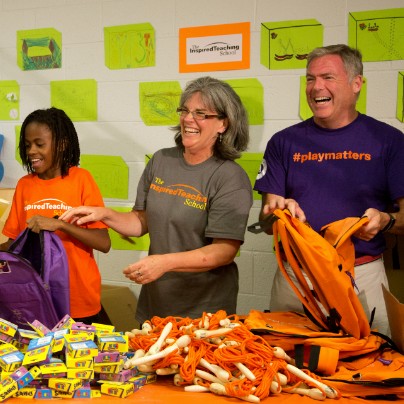By Hannah Horowitz, Tulane Student and Guest Blogger
What is social innovation anyway? How can universities best integrate social innovation curriculum into their institutions? What role should students play in shaping programming to work towards a better future? These questions, posed on the first day of the Ashoka U Exchange in Washington DC, set the tone for the Exchange’s commitment to challenging itself. While terms such as “social innovation” or “social entrepreneurship” often become clouded due to vague rhetoric, Ashoka isn’t content to let the answers to these questions be imprecise. While no question has a single answer, the people working to solve them consistently shared precise, ambitious, but very attainable solutions to pressing problems.
The conference, mainly geared towards university educators, was an eye-opening experience for me in that it provided insight into how social innovation is cultivated. It’s easy enough to look at a success story and think “wow, how impressive!” but it’s far more enriching to think “wow, how impressive, look at all the resources, education, thought, people, and intention that went into its creation!” While at the conference, I received a first-hand view into the backstory of two notable ventures: The Inspired Teaching School and the Food Recovery Network.
The Inspired Teaching School is a public charter school in its early years of operation. Founded on the principles of non-discrimination, restorative justice, and arts education, it’s not a surprise that the school receives hundreds of lottery applications each year for only about 50 spots. I could go on about the innovative design, the sheer radiance of the kids, and the passion of the teachers, but what really struck me was that everyone involved seemed so invigorated by the knowledge that they know they had a fantastic model and are on the forefront of reenvisioning education.
Inspired Teaching School! Obama! Wooho!
The Food Recovery Network is a student-run program that reduces food waste and lessens food insecurity across college campuses nationwide. I got the opportunity to visit University of Maryland, where they first began, speak with the founding members of the organization, and visit a local community partner that distributes meals to people who have minimal food access. Each year new colleges across the country begin FRN branches; to date, nearly 700,000 pounds of food that would otherwise have gone to waste have been recovered since 2011.
Another highlight was presenting about Tulane’s social venture incubator, The Changemaker Institute, in a panel discussion. As a social innovation fellow with CELT, I play a strong role in shaping the institute and it was an exciting learning experience to present alongside my colleague, Jenny McNulty, about the Institute and Tulane’s role in promoting social innovation. Especially as I prepare for my thesis defense and my senior research symposium, getting some hands on experience speaking in front of crowds was stimulating and confidence-boosting.
Attending Ashoka U was a fabulous capstone to my year working with CELT and to my undergraduate career. In-depth consideration of passion, impact, and community are indispensable as I move into making a career for myself and in envisioning my contributions to the communities in which I work and live.



